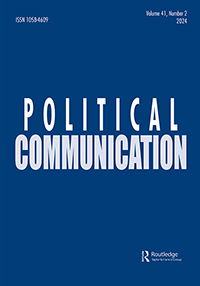Propagandization of Relative Gratification: How Chinese State Media Portray the International Pandemic
IF 5.1
1区 社会学
Q1 COMMUNICATION
引用次数: 1
Abstract
ABSTRACT While many previous studies have investigated propaganda in connection with misinformation, disinformation, or “fake news” campaigns, they have given insufficient attention to the political messages which are not squarely factually inaccurate but manipulated. This study identifies a political communication strategy, the propagandization of relative gratification, through which propaganda media 1) highlight global chaos to nudge the public’s downward comparison to a relatively stable domestic situation; 2) portray the nation’s adversaries as worse than its allies; and 3) leverages the public’s anti-foreign attitude. This study empirically examines Chinese state media’s approach to the coverage of the COVID-19 pandemic in 46 countries in 2020 by analyzing more than 3 million Chinese social media posts using the semantic similarity found in word embedding models. The results reveal that the global pandemic was depicted by the state media as generally more severe than China’s domestic situation. The more distant a foreign country’s relationship with China, the more severe its COVID-19 representation in China’s propaganda, deviating from the country’s actual epidemiological severity and what the Chinese general public thinks about it, indicating that a country’s relationship with China is an important predictor of how its COVID-19 severity was presented in China’s state media. This study extends the understanding of the sophisticated nature of propaganda in the current era.相对感恩的宣传:中国官方媒体如何报道国际大流行病
虽然许多先前的研究已经调查了与错误信息、虚假信息或“假新闻”运动有关的宣传,但他们对政治信息的关注不够,这些政治信息并非完全不准确,而是被操纵的。本研究确定了一种政治传播策略,即相对满足的宣传,通过这种宣传媒体,1)强调全球混乱,推动公众向下比较相对稳定的国内局势;2)把美国的对手描绘得比盟友更糟糕;3)利用公众的排外态度。本研究通过使用词嵌入模型中的语义相似度分析300多万条中国社交媒体帖子,实证检验了中国官方媒体在2020年对46个国家COVID-19大流行的报道方法。结果显示,官方媒体描述的全球大流行总体上比中国国内的情况更严重。一个国家与中国的关系越远,其在中国宣传中的新冠肺炎表征就越严重,偏离该国实际的流行病学严重程度和中国公众的看法,这表明一个国家与中国的关系是中国官方媒体如何呈现其新冠肺炎严重程度的重要预测指标。本研究扩展了对当今时代宣传复杂性的理解。
本文章由计算机程序翻译,如有差异,请以英文原文为准。
求助全文
约1分钟内获得全文
求助全文
来源期刊

Political Communication
Multiple-
CiteScore
13.90
自引率
2.70%
发文量
30
期刊介绍:
Political Communication is a quarterly international journal showcasing state-of-the-art, theory-driven empirical research at the nexus of politics and communication. Its broad scope addresses swiftly evolving dynamics and urgent policy considerations globally. The journal embraces diverse research methodologies and analytical perspectives aimed at advancing comprehension of political communication practices, processes, content, effects, and policy implications. Regular symposium issues delve deeply into key thematic areas.
 求助内容:
求助内容: 应助结果提醒方式:
应助结果提醒方式:


